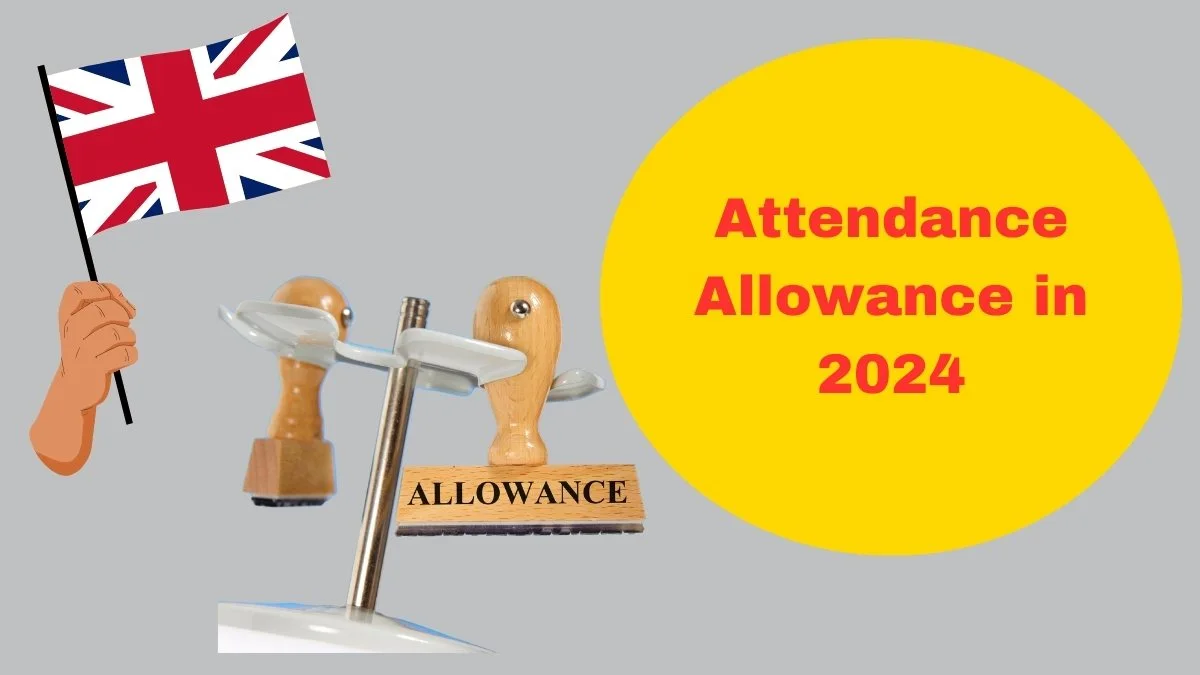Attendance Allowance 2024:Attendance Allowance is a vital non-means-tested benefit provided by the UK government to support individuals facing the challenges of disabilities in managing the additional costs associated with their care needs.

This financial assistance is available to those who have reached State Pension age, have a physical or mental disability requiring assistance with personal care, and have needed this level of support for at least 6 months. With two tiers – Lower Rate at £61.85 per week and Higher Rate at £92.40 per week – the amount awarded is based on the degree of care required.
Claiming is a straightforward process through the DWP’s official website or by contacting their helpline, and once approved, the benefit is disbursed weekly. However, it’s crucial to note that Attendance Allowance becomes taxable income if the overall income surpasses a specific threshold.
Attendance Allowance Eligibility Criteria 2024 :
Attendance Allowance is a vital financial support system in the UK for individuals of State Pension age or over who require assistance due to disability. To be considered eligible, applicants must meet specific criteria:
1. Age: Applicants must have reached State Pension age, currently 66, with a gradual increase to 67 by 2028.
2. Disability: A physical or mental disability must significantly impact one’s ability to manage personal care. This encompasses conditions like mobility impairments, sensory impairments, learning difficulties, mental health challenges, and chronic pain or fatigue.
3. Care Needs: The disability must necessitate assistance with personal care activities like bathing, dressing, or toileting, or require supervision for safety reasons. This need must have persisted for at least six months.
4. Residency and Presence: Applicants must be present in Great Britain when claiming, with exceptions for certain categories like armed forces personnel. Additionally, a minimum of two years’ residency in Great Britain within the past three years is required (excluding refugees and individuals with humanitarian protection status). Habitual residence within the UK, Ireland, Isle of Man, or Channel Islands is also a prerequisite.
5. Immigration and Benefits: Applicants must not be subject to immigration control unless they are sponsored immigrants. Furthermore, they cannot be concurrently receiving Disability Living Allowance (DLA), Personal Independence Payment (PIP), or Adult Disability Payment (ADP).
Assessment Process: The Department for Work and Pensions (DWP) evaluates each claim individually, considering the specific details of the applicant’s circumstances. This ensures a tailored approach to determining eligibility.
UK Attendance Allowance Rates 2024:
The Attendance Allowance benefit provides financial support to individuals over State Pension age with disabilities who require varying levels of care. It is paid at two distinct rates, reflecting the degree of assistance needed:
| Rate | Weekly Amount | Eligibility Criteria |
|---|---|---|
| Lower Rate | £68.10 | Requires frequent or constant supervision during the day, or supervision at night. |
| Higher Rate | £101.75 | Requires assistance or supervision throughout both day and night, or has a terminal illness with a life expectancy of 12 months or less. |
Attendance Allowance claim process 2024:
1. Eligibility Requirements:
- Age: Must be over State Pension age.
- Disability: Have a physical or mental disability requiring assistance or supervision with personal care needs.
- Residency: Have resided in Great Britain for at least two of the past three years.
2. Application Process:
- Method: Choose between:
- Downloading and completing the Attendance Allowance claim form: Available on GOV.UK. Submit it online or by post within six weeks.
- Calling the Attendance Allowance helpline: Request a form to be sent by post. Claim backdated to the call date, but return the completed form within six weeks.
- Form Completion: Be honest and detailed about your care needs, including specific difficulties during both day and night. Consider seeking assistance from Age UK or Citizens Advice if needed.
3. Supporting Documents:
- Prepare documents like proof of identity, address, NHS number, and any relevant medical reports, care plans, or evidence of your disability.
4. Submission:
- Send the completed form and supporting documents to the DWP office specified on the form.
5. Assessment:
- The DWP may contact you for further information or a home visit. Be prepared to discuss your needs openly and honestly.
6. Decision:
- You will receive a written decision within eight weeks. If successful, payments will commence within a few weeks.
7. Appeal Process:
- You have the right to appeal a negative decision within one month.
what happens if your claim is denied:
1. Understanding the Decision:
- Request a copy of the decision letter: This letter should explain the reason for the denial and outline the evidence used to reach that decision.
- Contact the DWP: You can call the DWP helpline at 0800 328 9330 or visit your local Jobcentre Plus to discuss the decision with a representative. They can clarify the reasons behind the denial and answer any questions you may have.
2. Reconsideration:
- Mandatory Reconsideration: This is a formal process where the DWP reviews your claim again, taking into account any additional evidence you may wish to submit. You can request a mandatory reconsideration within one month of receiving the decision letter.
- Contact Citizens Advice: They can help you understand the mandatory reconsideration process and guide you through the steps involved.
3. Appeal:
- Independent Tribunal: If you are still unhappy with the decision after the mandatory reconsideration, you can appeal to an independent tribunal. This is a formal hearing where you can present your case to a panel of independent judges.
- Seek Legal Advice: Consider seeking legal advice from a specialist disability rights solicitor or advocate. They can guide you through the appeals process and represent you at the tribunal hearing.
4. Additional Points:
- Gather Evidence: If you are considering a reconsideration or appeal, it is important to gather any additional evidence that supports your claim. This could include medical reports, letters from healthcare professionals, or statements from friends or family members who can attest to your care needs.
- Seek Support: Don’t hesitate to reach out to disability charities or support groups for advice and assistance. They can offer emotional support and connect you with resources that can help you through this process.
How long does the claim process take?
Initial Claim:
- Standard processing time: Generally, it takes 30 working days from the date the Department for Work and Pensions (DWP) receives your completed claim form to make a decision.
- Faster track: If you are terminally ill and have less than six months to live, your claim will be prioritized and processed much quicker.
- Complex cases: Claims involving additional complexities, such as extensive medical evidence or unclear eligibility, might take longer than 30 days.
Reconsideration or Appeal:
- Mandatory Reconsideration: This typically takes around six weeks after requesting it.
- Independent Tribunal: The waiting time for a tribunal hearing can vary widely, potentially ranging from several months to a year.
Common misconceptions about Attendance Allowance:
Misconception 1: Attendance Allowance is means-tested.
Fact: Attendance Allowance is non-means-tested. This means your income or savings do not affect your eligibility. The focus solely lies on the level of care your disability necessitates.
Misconception 2: Attendance Allowance is only for the elderly.
Fact: While a significant portion of recipients are over State Pension age (currently 66), Attendance Allowance is open to anyone who meets the eligibility criteria, regardless of age. Individuals of all ages with qualifying disabilities can claim.
Misconception 3: Attendance Allowance is only for physical disabilities.
Fact: Attendance Allowance covers both physical and mental disabilities causing significant care needs. The assessment focuses on the level of assistance required for personal care and safety, not the specific type of disability.
Misconception 4: You need a carer to claim Attendance Allowance.
Fact: Having a carer is not a requirement for claiming Attendance Allowance. The focus lies on the need for care, regardless of whether it’s provided by a formal carer, family, friends, or yourself.
Misconception 5: Attendance Allowance is difficult to claim.
Fact: While the process can seem complex, claiming Attendance Allowance is relatively straightforward. Resources like online forms, phone helplines, and citizen advice services are available to support applicants throughout the process.
Misconception 6: Attendance Allowance is a small amount of money.
Fact: Attendance Allowance currently offers two tiers: a Lower Rate of £61.85 per week and a Higher Rate of £92.40 per week. While not a substantial income, it can significantly contribute towards managing disability-related expenses.
Spreading awareness about these misconceptions is crucial to ensure everyone who qualifies for Attendance Allowance can access this valuable support. By clarifying these common misunderstandings, individuals can make informed decisions about claiming and benefit from the financial assistance available to them.
What happens if my care needs change?
Increase in care needs:
- If your condition worsens or your care needs increase, you may be eligible for a higher rate of Attendance Allowance.
- You’ll need to provide evidence of the change, such as updated medical reports or statements from healthcare professionals.
- The DWP will assess your claim and adjust your payment accordingly, potentially backdated to the date your care needs changed.
Decrease in care needs:
- If your condition improves or your care needs decrease, you may be eligible for a lower rate of Attendance Allowance or even lose your entitlement altogether.
- Failing to inform the DWP about a decrease in care needs could lead to an overpayment, which you’ll be required to repay.
- It’s important to notify the DWP promptly even if you’re unsure about the long-term impact of the change.
Will my Attendance Allowance affect other benefits I receive?
Potential increases in other benefits:
- Pension Credit: If you receive Pension Credit, claiming Attendance Allowance might entitle you to additional payments. This is because Attendance Allowance is considered a disability-related income and can increase your net income used to calculate Pension Credit. Contact the Pension Service to update your circumstances and potentially increase your Pension Credit.
- Housing Benefit and Council Tax Reduction: Similar to Pension Credit, Attendance Allowance can also lead to increased Housing Benefit and Council Tax Reduction due to the change in your income. Again, inform the relevant authorities about your Attendance Allowance to ensure you receive the correct level of support.
Other potential benefits:
- Help with health costs: You might be eligible for additional assistance with health costs, such as prescriptions and NHS dental treatment, due to your Attendance Allowance.
- Disabled Person’s Railcard: Receiving Attendance Allowance allows you to purchase a Disabled Person’s Railcard, offering discounted travel on trains.
- Blue Badge: Attendance Allowance can support your application for a Blue Badge, granting you easier access to parking designated for disabled individuals.
No negative impact on existing benefits:
- Receiving Attendance Allowance will not affect other benefits you receive, such as Disability Living Allowance (DLA) or Personal Independence Payment (PIP). You can claim both Attendance Allowance and these benefits simultaneously if you meet the eligibility criteria for each.
Important points to remember:
- Inform relevant authorities: Always update the DWP and any other benefit agencies about your Attendance Allowance claim to ensure you receive the correct level of support across all benefits.
- Seek professional advice: If unsure how Attendance Allowance might affect your other benefits, consider seeking guidance from Citizens Advice, Scope, or other disability rights organizations.
Overall, claiming Attendance Allowance can have positive implications for your overall financial situation and access to other support services. Be proactive in informing relevant authorities and seek professional advice if needed to maximize the benefits you deserve.
VISIT USAOFFBEAT HOMEPAGE FOR LATEST INFORMATION
